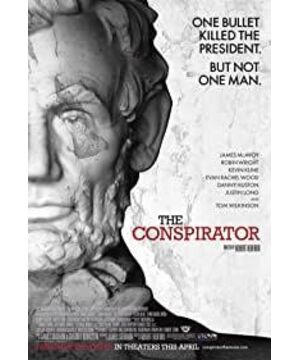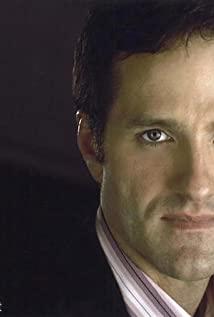In troubled times, freedom cannot be defended, and tyranny has nowhere to deliver justice... But the balance of justice gradually finds a fulcrum in chaos and struggle. This process requires people with courage and conscience to promote it.
"Accomplice" is about such a person with courage and conscience (------represented by defense attorney Frederick Aiken, including Congressman Reverdy Johnson in history, who supported the defense until the closing statement. It is different from the performance of the film. , there have been other defense attorneys in history, and there are more witnesses), at least Robert Redford did everything possible to get the audience to identify with this courage and "progressive thinking".
But as a drama about American history, it tells a well-known background and explores the very controversial Lincoln assassination trial. No matter what method and angle, it will definitely bring the same controversy. For many American intellectuals and "senior audiences", this history is too familiar. Everyone has a fixed opinion. They may prefer to see innovative viewpoints, sharper expressions, and more thought-provoking opinions in the film. , or, more objectively.
Especially this is a Redford movie. He loves politics, and objectivity and repetition are not enough for Redford. The result is a pity, "Accomplice" seems to be another unsuspenseful "Lion in the Mouth", Redford still repeats the opinion that has already formed a consensus (for Americans, it is too early for China), but it is not surprising expressed. And Solomon is a young screenwriter with only TV experience before, young and mediocre.
Redford's standpoint in this film is clear, mainstream and republican-----wartime military courts trying ordinary citizens' cases will definitely bring unjust trials, the military's jurisdiction over civilians (jurisdiction---jurisdictional power, Judicial power) is a kind of overstepping. When the war is about to end, the power to the military and the president should be withdrawn as soon as possible, otherwise it will cause obstruction of justice and then unconstitutional.
It is common sense to write this into American history.
"Accomplice" does not write too much on the background environment, such a complex and controversial famous event, but does not depict many living beings. Totally stuck with the backbone of Mary Surratt and defense attorneys. Flat as a textbook.
American audiences have little need for a cultural and educational film that popularizes history.
Redford was too pedantic and too eloquent with his compatriots.
You can't teach the law in a country with a well-developed legal system, and these audiences often watch TV and mass media to reflect on the legal system -- usually over-reflective, so they don't care about the primary course.
Popularization of the law, foreign talents who do not believe in the law buy it.
The possible potential audience of "Accomplice" should be a country that has yet to open up the wisdom of the people, a country where legal dramas are rarely shown on TV, and citizens have a vague concept of court trials. The kind of country that is able to release this film publicly is a kind of historical progress.... And
about the film, compared to the later Milligan lawsuit (March 1866), Mary Surratt is a bad time. . Milligan was later acquitted thanks to the Supreme Court's refutation of military jurisdiction, and even rebellion charges were tried in ordinary courts with a jury vote. In the end, when John Surratt, the son of the protagonist Mary Surratt, who actually participated in the planning of the kidnapping, and possibly in the murder of Lincoln, was arrested, the jury finally ruled 8:4 that the trial was invalid. acquitted. Combined with the controversial allegations and testimony against Mary Surratt in the film, as well as the objection of unreliable witnesses and the judge, it is somewhat ironic.
However, the legal system in wartime also has its necessity for its existence. In the face of the enemy, if the army is controlled, it means that the war will end. The end of the war, the balance of the chaotic situation can not rely on the military and government control, this is the balance point of governance. Failure of the rule of law will surely harm future generations.
Should the justice of the trial procedure be sacrificed for the immediate social harmony? Which one is more important, social stability or judicial justice? --------This is the pressure of public opinion, the pressure from the military and the inner conflict faced by defense lawyer Frederick Aiken in the second half of the film. The audience is also under a lot of pressure.
The American Civil War can also be said to have been inspired by trials to a certain extent, and finally returned to "justice". The so-called justice needs reasonable judicial procedures to explain, and regulation cannot bring justice. After the end of the civil war, the United States finally returned to "lawyers ruling the country" from arms control. Of course, the controversy about military courts has never stopped....
This movie refers to reading "25 Major Cases Affecting the United States"----------The president is bigger than the Supreme Court?
It couldn't be more appropriate to understand. Recommended reading link http://news.163.com/08/0229/09/45S2A87I00012GGE.html
Mary Surratt's Wiki entry in the movie has a detailed trial process, and the movie and historical records are uninspired to maintain a high degree of consistency
http: //en.wikipedia.org/wiki/Mary_Surratt
Mary Surratt was charged with conspiring to assassinate Lincoln's boarding house, now a restaurant, called the "Precious House". (Mary E. Surratt House---- http://en.wikipedia.org/wiki/File:Mary_E._Surratt_House.JPG Friends who go to Washington Chinatown~ You can pay attention)
View more about The Conspirator reviews











